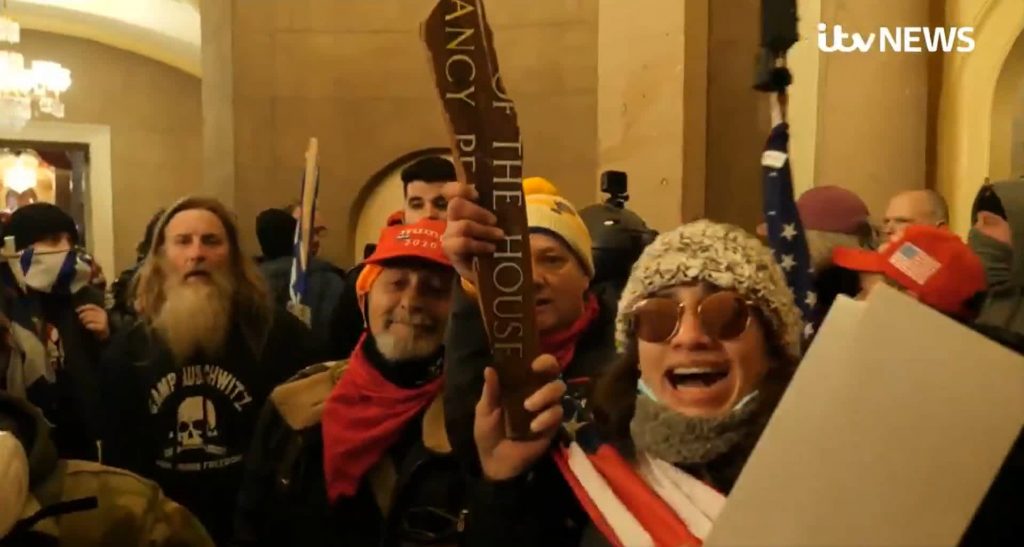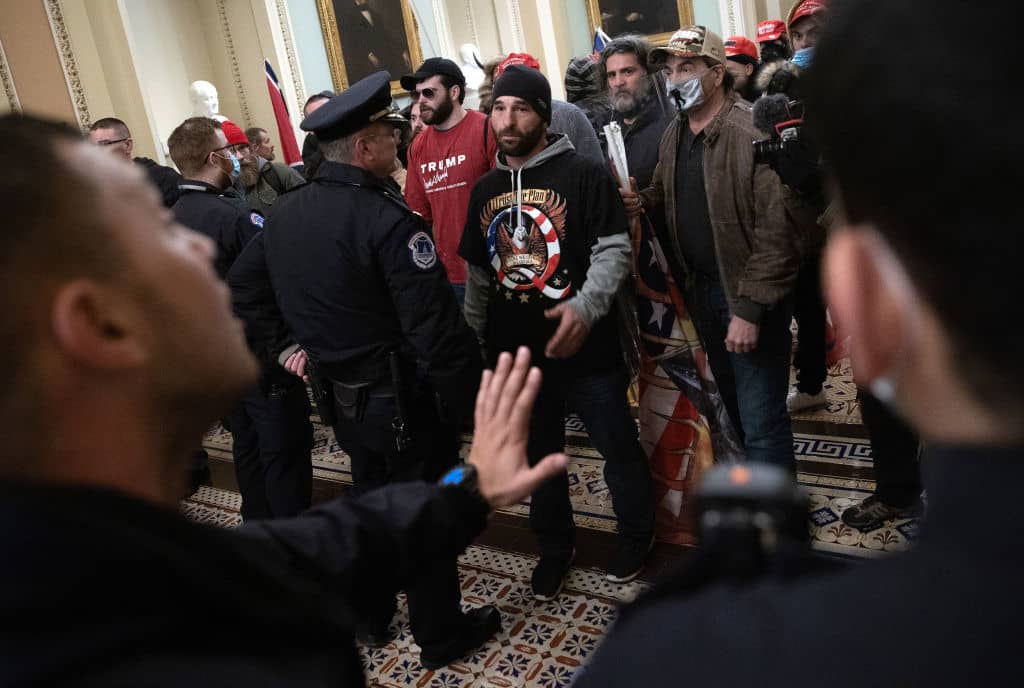On Thursday, we awoke to the sounds of American democracy being shattered by jackbooted “patriots” waving flags and wearing neo-Nazi insignia. If this had taken place in any other country on Earth, we would be describing it as an act of right-wing insurgency, a coup attempt from a failing leader refusing to leave office.
It’s the type of action that might prompt Afghanistan or Iraq to mount an invasion of the country to restore democracy. Or would if their militaries and state institutions had not been so eviscerated by American freedom bombs.
Interestingly however, much of the narrative of the coverage portrayed the people waving guns and chanting anti-democratic slogans as “protestors”, “Trump supporters”, or “rioters”.
They are not. Language is important in these matters and referring to the people who occupied and violently seized control of the halls of power as out-of-control individuals in this way masks the reality of the controlled, concerted efforts of right-wing groups to commit acts of terror and violence for political aims.
Many of the people involved here were part of known neo-Nazi groups, organised online and egging one another on social media and far-right forums. It’s everything we know and understand terrorism to be but without giving it the label it deserves.
In “the West” – however you want to define that term – we have an issue labelling our own as terrorists. Australia has a legacy of using language to characterise and explain away the actions of certain people while wielding it to great effect to demonise and persecute others. It’s something we need to discuss.

One Person’s Terrorist is Another Persons Freedom Fighter
I get it. Language is slippery. There are those who would classify last year’s BLM protests as terror incidents, looting, and rioting, while others see them as the violent expression of years of repression and injustice, liberating actions of free speech and protected under the right to freedom of expression and the democratic right to protest.
If we start calling everyone we disagree with terrorists, the word loses all meaning and we’re stuck just throwing mud at each other. Not that this isn’t already the case.
But terror and terrorism have pretty well-defined distinctions and ones that can meaningfully and accurately be applied to the actions of the people we saw on Thursday.
The United Nations Office on Drugs and Crime, while acknowledging the difficulties of the term, has a “partial, customary definition of terrorism” which follows:
Terrorism comprises of
(i) the perpetration of a criminal act (such as murder, kidnapping, hostage-taking, arson, and so on), or threatening such an act
(ii) the intent to spread fear among the population (which would generally entail the creation of public danger) or directly or indirectly coerce a national or international authority to take some action, or to refrain from taking it;
(iii) when the act involves a transnational element.
The transnational element is interesting here as that understanding seems to have spawned the phrase “domestic terrorism” when talking about actions such as the ones at the US Capitol.
That aside, the “criminal acts” perpetrated by those on Thursday certainly incorporated elements of the intentional “spread[ing] of fear among the population” and to “directly or indirectly coerce a national or international authority to take some action”, namely, the reinstatement of Donald Trump as President. So, terrorism then.
Terrorism as a term, though, is one that swarmed into our collective consciousness in a new way with George Bush’s “war on terror”, linking the phrase indelibly with Al-Quaeida, the Middle East, and Muslims more broadly. This association is one we still struggle with when using the phrase to define those whose actions might fit the definition but whose profiles do not.
Not that the term hasn’t evolved since then. China has defended its policies of the detention and forced labour of the Uighur people in Xinjiang as protecting the state against terrorists. So too did Myanmar in its persecution and attempted genocide of the Rohingya people. Tellingly, both of these populations are predominantly Muslim.
Australia, Take Note
Australia is not exempt from these difficulties with calling a spade a spade. We do shit like this all the time. Think about the phrase “boat people”, how the legitimate human right to flee conflict and seek asylum and a better life has been so marginalised in our society that it’s likely to earn you a spot in one of the most shadowy and secretive prison camps on the planet.
Australia also struggled with the fact that one of its own had gone over to our neighbours house and gunned down 51 people in a Mosque in Christchurch. He was described as a “lone wolf”, a “disturbed individual”, but it took a long time to come around to the fact that this was terrorism, plain and simple.
Academics have been concerned for some time about the rise in right-wing terrorism in Australia. Just last month, it was announced that the parliamentary joint committee on intelligence and security will launch a federal inquiry into right-wing extremism in Australia. The inquiry will examine the the nature, extent and threat of extremist movements, something pushed for by the Labor Party.
The fears that sparked the inquiry are that our pandemic-induced online activates have caused a spike in extremism. One only has to look at the flood of anti-vaxx, climate change denial, and conspiracy that has gripped the world during our extended periods inside with nothing to do. Case in point, Pete Evans.
We need to start calling this stuff out for what it is and redefining our understanding of those who perpetuate acts of terror. With the pandemic far from over, the fall-out from all of this is likely to be felt for years to come.







